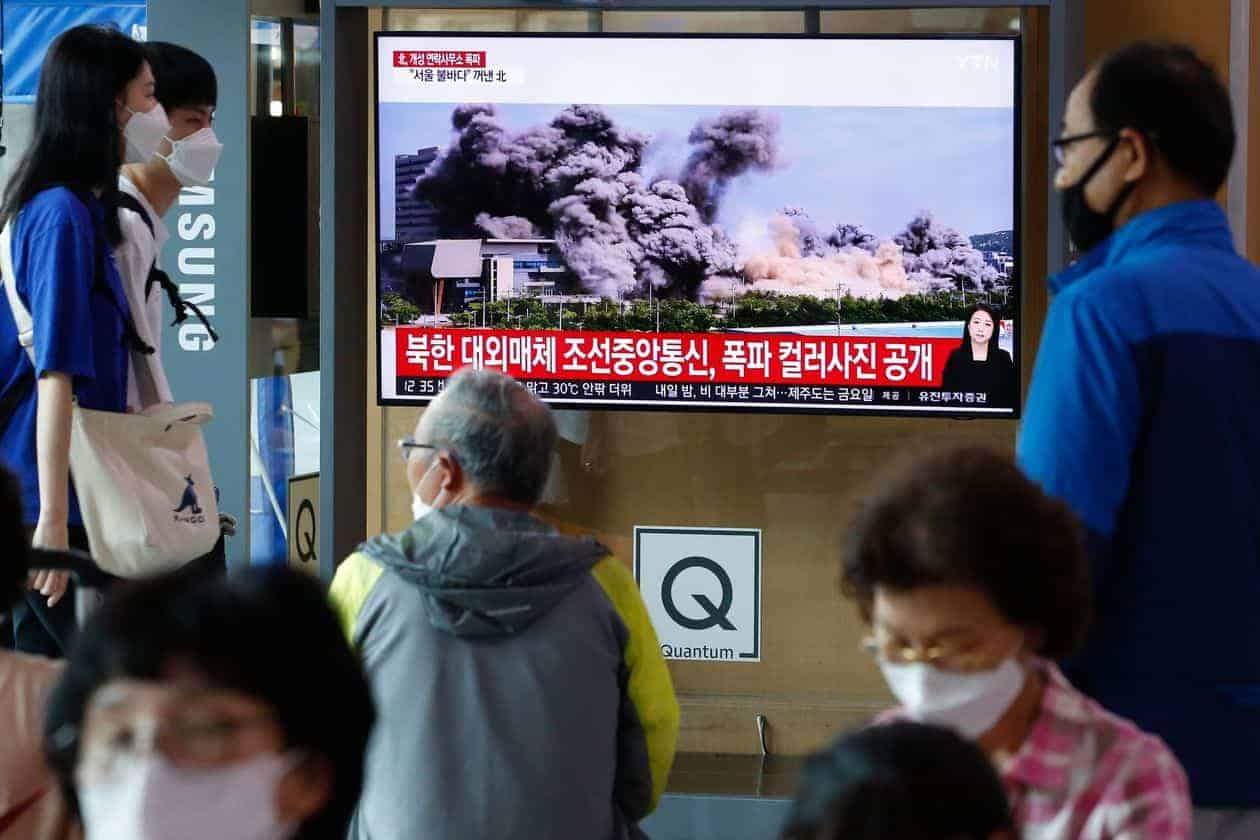South Korea Takes Harder Line After North Blows Up Liaison Office

It took flattening a symbol of Korean unity for South Korea to lose its patience.
Seoul has long exercised restraint with its provocative northern neighbor, in hopes of drawing Pyongyang into peace talks. This even-tempered approach became especially pronounced under President Moon Jae-in, who staked his legacy on warming ties with the North upon taking office in 2017 when the Korean Peninsula stood on the brink of war.
But on Wednesday, Mr. Moon’s administration dropped the pleasantries. South Korea chided the Kim Jong Un regime over its “rude and senseless” remarks, a day after North Korea blew up a liaison office jointly run by both countries.
The implosion of the office building in Kaesong, which operated as a de facto embassy, has drawn minimal response from the U.S. But the North’s premeditated destruction dragged relations between the two Koreas down to the lowest level in years.
Seoul had taken a pacifying tone, even during the North’s recent spree of antagonistic state-media missives triggered by South Korea-based defector groups distributing antiregime leaflets over the inter-Korean border. As recently as Monday, Mr. Moon, in a speech, encouraged the North to not give up on peace.
Two days later, Kim Yo Jong, the North Korean regime’s mouthpiece and sister of leader Kim Jong Un, lambasted Mr. Moon’s recent remarks as “sophism full of shamelessness and impudence,” state media reported. The South Korean leader, Ms. Kim added, should have used the Monday speech to apologize instead.
Earlier in the day, Ms. Kim, 32, rejected South Korea’s request to send a special envoy for talks, calling the offer a “tactless and sinister proposal.”
Ms. Kim’s criticisms drew unusual condemnation across the Moon administration. “We won’t tolerate the North’s unreasonable words and acts anymore,” a presidential Blue House spokesman said. Seoul’s defense ministry warned that the North would pay a price if it undertook military action against the South. Hours later, South Korea’s unification minister abruptly resigned, saying he had failed to meet expectations.
“We’re at a new starting point in inter-Korean relations,” said Cheon Seong-whun, a former South Korean national security official.
The startling sequence of events represents a major policy setback for Mr. Moon, who helped bring President Trump and Mr. Kim together after a year of heightened tensions in 2017. An invitation to the 2018 Winter Olympics and three inter-Korean summits that year brought the two Koreas close together. But the Kim regime has snubbed Mr. Moon after last year’s Vietnam nuclear summit ended abruptly without a deal.
Now many of the foundational accords struck by the two Koreas in 2018 are disappearing. Pyongyang last week severed all official communication lines with Seoul. The liaison office is in ruins. And the short-term prospects for another inter-Korean summit look minuscule.
North Korea’s near-term aim appears to be distracting its domestic audience from immediate economic challenges caused by U.S.-imposed sanctions and the spread of the coronavirus, experts say. By labeling South Korea as an enemy, the North can blame any internal dysfunction on an external threat, experts say.
“The regime needs a scapegoat,” said Cha Du-hyeogn, a visiting fellow at the Asan Institute, a Seoul-based think tank. “It needs to show its people that it’s not Kim Jong Un’s fault that the country is going through economic challenges.”
The likely near-term provocation would involve shows of force near the inter-Korean border, experts say. It could be a temporary violation of the maritime boundary in the Yellow Sea by a North Korean warship, or a resumption of artillery drills that Pyongyang halted near the border after a 2018 military deal with the South, security experts say. Cyber hacking attacks also can’t be ruled out.
Longer term, North Korea is seeking to slowly regain the attention of the Trump administration that it lost after both sides left Hanoi without a deal.
“North Korea is taking a wait-and-see stance toward the U.S., but it knows it has to re-engage the U.S. sooner or later,” said Kim Jina, a researcher at the Korea Institute of Defense Analyses, a South Korean state-run think tank.
Pyongyang’s current behavior reminds some close Kim-regime watchers of a provocation cycle that unfolded a decade ago, when then-leader Kim Jong Il fell ill without a successor in place. Around that time, the country imposed an abrupt monetary-reform policy that devalued its currency, drawing widespread discontent from North Koreans who saw savings wiped out.
In 2010, North Korea carried out two surprise military attacks against the South, shelling an island and sinking a naval ship. Some 50 South Koreans died. After those incidents, South Korea soon halted most of its trade with the North and imposed unilateral sanctions on its neighbor.
For now, North Korea is unlikely to conduct any lethal attacks as it would give justification for South Korea and its U.S. ally to respond with their own military forces, security experts say. The liaison office, temporarily shut since January over coronavirus fears, had been vacated by the South Koreans and appeared empty.
South Korea’s traditional approaches to the North have vacillated between engagement and confrontation. But the Moon administration now needs to consider a new approach by viewing the regime and the North Korean citizenry as distinct groups, said Mr. Cheon, the former security official.
“We must sanction, pressure, and deter the regime,” Mr. Cheon said. “But we should provide outside information to the population, so it can develop the power to change the regime.”
Photo: North Korea on Tuesday blew up a liaison office jointly run with the South. -KIM HEE-CHUL/SHUTTERSTOCK











